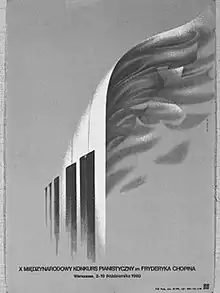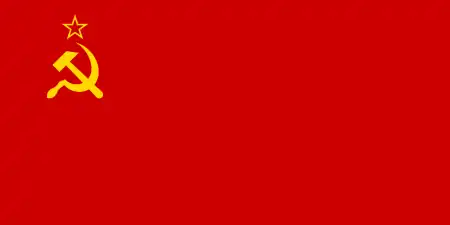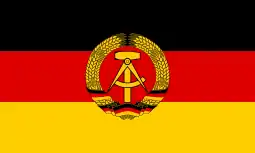X International Chopin Piano Competition
The X International Chopin Piano Competition (Polish: X Międzynarodowy Konkurs Pianistyczny im. Fryderyka Chopina) was held from 1 to 20 October 1980 in Warsaw. Đặng Thái Sơn, who in the final played with an orchestra for the first time in his life, won first prize, becoming the first pianist from Asia to do so. The elimination of Ivo Pogorelić after the third stage was a great source of controversy.
| The Tenth International Fryderyk Chopin Piano Competition | |
|---|---|
 | |
| Date | 1–20 October 1980 |
| Venue | National Philharmonic, Warsaw |
| Hosted by | Fryderyk Chopin Society |
| Winner | |
Awards
The competition consisted of three elimination stages and a final with seven pianists.
The following prizes were awarded:[1]
| Prize | Winner | |
|---|---|---|
| Đặng Thái Sơn | ||
| Tatiana Shebanova | ||
| Arutyun Papazyan | ||
| 4th | not awarded | |
| 5th | Akiko Ebi | |
| Ewa Pobłocka | ||
| 6th | Erik Berchot | |
| Irina Pietrova | ||
| HM | Dan Atanasiu | |
| Bernard d'Ascoli | ||
| Angela Hewitt | ||
| Hung-Kuan Chen | ||
| Kevin Kenner | ||
| Alexander Lonquich | ||
| Ivo Pogorelić | ||
| William Wolfram | ||
Three special prizes were awarded:
| Special prize | Winner | |
|---|---|---|
| Best Performance of a Concerto | Đặng Thái Sơn | |
| Tatiana Shebanova | ||
| Best Performance of Mazurkas | Đặng Thái Sơn | |
| Ewa Pobłocka | ||
| Best Performance of a Polonaise | Đặng Thái Sơn | |
| Tatiana Shebanova | ||
Jury
The jury consisted of:[1]
 Martha Argerich (
Martha Argerich ( VII)
VII) Paul Badura-Skoda
Paul Badura-Skoda Rodolfo Caporali
Rodolfo Caporali.svg.png.webp) Josep Colom
Josep Colom Halina Czerny-Stefańska (
Halina Czerny-Stefańska ( IV)
IV) Sergei Dorensky
Sergei Dorensky Jan Ekier
Jan Ekier.svg.png.webp) Liuba Enczewa
Liuba Enczewa Rudolf Fischer
Rudolf Fischer Lidia Grychtołówna
Lidia Grychtołówna.svg.png.webp) Iving Heller
Iving Heller.svg.png.webp) Rex Hobcroft
Rex Hobcroft Ludwig Hoffmann
Ludwig Hoffmann Andrzej Jasiński
Andrzej Jasiński Geneviève Joy
Geneviève Joy Louis Kentner
Louis Kentner Kazimierz Kord (chairman)
Kazimierz Kord (chairman) Eugene List
Eugene List.svg.png.webp) Nikita Magaloff (vice-chairman)
Nikita Magaloff (vice-chairman) Frantisek Rauch (vice-chairman)
Frantisek Rauch (vice-chairman) Regina Smendzianka
Regina Smendzianka Péter Solymos
Péter Solymos Zbigniew Śliwiński
Zbigniew Śliwiński.svg.png.webp) Kazuko Yasukawa
Kazuko Yasukawa Tadeusz Żmudziński
Tadeusz Żmudziński
Pogorelić Scandal
There was a sensation at the 1980 Chopin Competition in Warsaw when, in a decision going against audience opinion, Ivo Pogorelić was not admitted to the final round because of his unconventional interpretations. This came about because of a wide discrepancy in the jury’s marking; half the panel of judges gave him the highest number of points and half the lowest. He was awarded only a special prize for his “exceptionally original pianistic talent”. Others were less fond of his less traditional style of play.
Jury member Eugene List explained: "I'm the first to say that the boy is very talented [...] but I voted very low for him. This is a special kind of competition. It's only Chopin. He doesn't respect the music. He uses extremes to the point of distortion. And he puts on too much of an act." Louis Kentner resigned after the first stage after all of his students had been eliminated from the competition,[1] saying that "if people like Pogorelić make it to the second stage, I cannot participate in the work of the jury. We have different aesthetic criteria."[2]
In the third stage, Pogorelić once again caused controversy, performing his program in the wrong order, leaving the stage part way through, and wearing an extravagant concert attire that made him look like "a prince dropped in the middle of the desert". In the end, Pogorelić was not admitted into the final. Martha Argerich resigned in protest, proclaiming him a "genius" who "her colleagues could not appreciate because of an entrenched conservatism", which is "why she was ashamed to be associated with them". Nikita Magaloff and Paul Badura-Skoda announced their solidarity with Argerich, though coming short of resigning themselves, declaring that it was "unthinkable that such an artist should not make it to the finals".[2] According to Đặng Thái Sơn, the eventual winner, Argerich still sent a public telegram to Warsaw to congratulate him, after learning the final results.[3]
Pogorelić later accused in a one-sided interview in 1993, claiming that "The Soviet Bloc authorities had decided months before the competition that it was politically necessary to have a North Vietnamese winner. My decision to participate was not at all welcome. I was told I should wait a year, for the Tchaikovsky competition, when I would have the first prize guaranteed."[4] In 2008, he demanded an official inquiry into the jury decisions of the 1980 competition, however, the Chopin Institute refused to reopen the case.[2]
References
- "The 10th International Fryderyk Chopin Piano Competition". Fryderyk Chopin Institute. Retrieved 29 July 2021.
- McCormick, Lisa (2018). "Pogorelich at the Chopin: Towards a sociology of competition scandals". The Chopin Review. Fryderyk Chopin Institute (1). ISSN 2544-9249.
- Ho, Elijah (22 September 2011). "Interview with Dang Thai Son". The Counterpoints.
- Henken, John (13 January 1993). "Pogorelich Founds Piano Competition". Los Angeles Times.
Further reading
- Ekiert, Janusz (2010). The Endless Search for Chopin: The History of the International Fryderyk Chopin Piano Competition in Warsaw (1st ed.). Warsaw: Muza. ISBN 978-83-7495-812-7.
- Arendt, Ada; Bogucki, Marcin; Majewski, Paweł; Sobczak, Kornelia (2020). Chopinowskie igrzysko. Historia Międzynarodowego Konkursu Pianistycznego im. Fryderyka Chopina 1927–2015 [The Chopin Games. The History of the International Fryderyk Chopin Piano Competition 1927–2015] (in Polish) (1st ed.). Warsaw: Wydawnictwa Uniwersytetu Warszawskiego. ISBN 978-83-235-4127-1.
- Ossowski, Jerzy; Brodska, Halina (2010). The International Fryderyk Chopin Piano Competition in photographs. Warsaw: Fryderyk Chopin Institute. ISBN 978-83-61142-36-2.